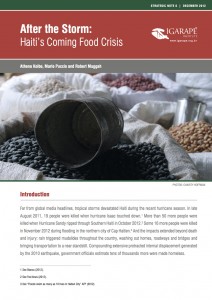 by Athena Kolbe, Marie Puccio and Robert Muggah. Igarapé Institute, Strategic Note 6, December 2012, 13 pages
by Athena Kolbe, Marie Puccio and Robert Muggah. Igarapé Institute, Strategic Note 6, December 2012, 13 pages
Excerpt from the introduction:
The 2012 hurricane season generated profound impacts on Haiti’s population by reducing food security and limiting basic service provision. Garnering lessons from these events can potentially help mitigate a future food crisis. Drawing on
extensive household surveys conducted in October and November 2012, key findings of this Strategic Note include:
- Rural households in the surveyed areas of Haiti’s Ouest, Nord and Grand’Anse departments experienced severe food shortages after tropical storms hit Haiti during October and November 2012. Nearly 70 per cent of households experienced moderate or severe hunger as measured by the USDA Food Security Scale.
- Following the last round of tropical storms, more than two thirds (68.3 per cent) of surveyed households lost crops from their fields. Owing to differences in crop varieties and the physical geography of farming land, this was more common in the Grand’Anse and Ouest (72.5 per cent) than in the Nord (40.1 per cent).
- Education, employment (in addition to farming), and receiving financial remittances from family or friends abroad were all protective factors for post-storm hunger. Receiving any money at all from abroad in the last 12 months made a household 8.1 times less likely to experience hunger after the storm.
- Post-disaster water issues are pervasive. Less than ten percent of surveyed households were drinking treated water in the week after the storm. This is in addition to the fact that overflowing latrines (reported by 40 percent of households) may have contaminated the home’s water supply.
- Barring significant intervention, over the next six to twelve months, Haiti’s food security situation looks bleak.
With roughly three quarters of households surveyed lacking the seeds, cuttings and tubers needed to grow food during the coming season, it is likely that the country will be forced to import more expensive food from abroad to meet the needs of the local population.
